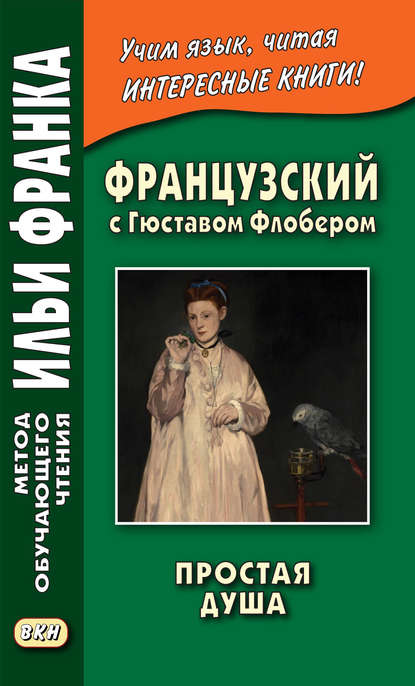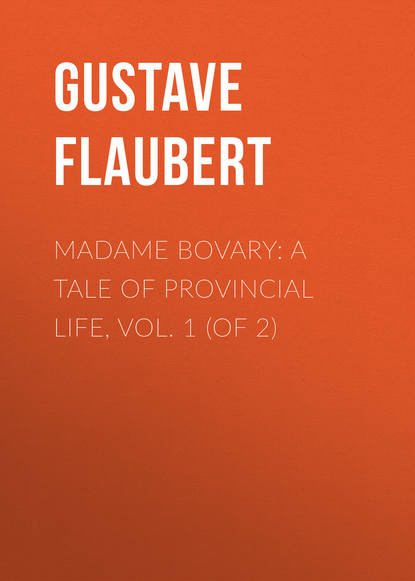
Полная версия
Sentimental Education; Or, The History of a Young Man. Volume 2
In the middle of the anteroom, Martinon, who had arrived at the same time as he had, turned round:
"What! so you are visiting here?" with a look of surprise, and as if displeased at seeing him.
"Why not?"
And, while asking himself what could be the cause of such a display of hostility on Martinon's part, Frederick made his way into the drawing-room.
The light was dim, in spite of the lamps placed in the corners, for the three windows, which were wide open, made three large squares of black shadow stand parallel with each other. Under the pictures, flower-stands occupied, at a man's height, the spaces on the walls, and a silver teapot with a samovar cast their reflections in a mirror on the background. There arose a murmur of hushed voices. Pumps could be heard creaking on the carpet. He could distinguish a number of black coats, then a round table lighted up by a large shaded lamp, seven or eight ladies in summer toilets, and at some little distance Madame Dambreuse in a rocking armchair. Her dress of lilac taffeta had slashed sleeves, from which fell muslin puffs, the charming tint of the material harmonising with the shade of her hair; and she sat slightly thrown back with the tip of her foot on a cushion, with the repose of an exquisitely delicate work of art, a flower of high culture.
M. Dambreuse and an old gentleman with a white head were walking from one end of the drawing-room to the other. Some of the guests chatted here and there, sitting on the edges of little sofas, while the others, standing up, formed a circle in the centre of the apartment.
They were talking about votes, amendments, counter-amendments, M. Grandin's speech, and M. Benoist's reply. The third party had decidedly gone too far. The Left Centre ought to have had a better recollection of its origin. Serious attacks had been made on the ministry. It must be reassuring, however, to see that it had no successor. In short, the situation was completely analogous to that of 1834.
As these things bored Frederick, he drew near the ladies. Martinon was beside them, standing up, with his hat under his arm, showing himself in three-quarter profile, and looking so neat that he resembled a piece of Sèvres porcelain. He took up a copy of the Revue des Deux Mondes which was lying on the table between an Imitation and an Almanach de Gotha, and spoke of a distinguished poet in a contemptuous tone, said he was going to the "conferences of Saint-Francis," complained of his larynx, swallowed from time to time a pellet of gummatum, and in the meantime kept talking about music, and played the part of the elegant trifler. Mademoiselle Cécile, M. Dambreuse's niece, who happened to be embroidering a pair of ruffles, gazed at him with her pale blue eyes; and Miss John, the governess, who had a flat nose, laid aside her tapestry on his account. Both of them appeared to be exclaiming internally:
"How handsome he is!"
Madame Dambreuse turned round towards him.
"Please give me my fan which is on that pier-table over there. You are taking the wrong one! 'tis the other!"
She arose, and when he came across to her, they met in the middle of the drawing-room face to face. She addressed a few sharp words to him, no doubt of a reproachful character, judging by the haughty expression of her face. Martinon tried to smile; then he went to join the circle in which grave men were holding discussions. Madame Dambreuse resumed her seat, and, bending over the arm of her chair, said to Frederick:
"I saw somebody the day before yesterday who was speaking to me about you – Monsieur de Cisy. You know him, don't you?"
"Yes, slightly."
Suddenly Madame Dambreuse uttered an exclamation:
"Oh! Duchesse, what a pleasure to see you!"
And she advanced towards the door to meet a little old lady in a Carmelite taffeta gown and a cap of guipure with long borders. The daughter of a companion in exile of the Comte d'Artois, and the widow of a marshal of the Empire; who had been created a peer of France in 1830, she adhered to the court of a former generation as well as to the new court, and possessed sufficient influence to procure many things. Those who stood talking stepped aside, and then resumed their conversation.
It had now turned on pauperism, of which, according to these gentlemen, all the descriptions that had been given were grossly exaggerated.
"However," urged Martinon, "let us confess that there is such a thing as want! But the remedy depends neither on science nor on power. It is purely an individual question. When the lower classes are willing to get rid of their vices, they will free themselves from their necessities. Let the people be more moral, and they will be less poor!"
According to M. Dambreuse, no good could be attained without a superabundance of capital. Therefore, the only practicable method was to intrust, "as the Saint-Simonians, however, proposed (good heavens! there was some merit in their views – let us be just to everybody) – to intrust, I say, the cause of progress to those who can increase the public wealth." Imperceptibly they began to touch on great industrial undertakings – the railways, the coal-mines. And M. Dambreuse, addressing Frederick, said to him in a low whisper:
"You have not called about that business of ours?"
Frederick pleaded illness; but, feeling that this excuse was too absurd:
"Besides, I need my ready money."
"Is it to buy a carriage?" asked Madame Dambreuse, who was brushing past him with a cup of tea in her hand, and for a minute she watched his face with her head bent slightly over her shoulder.
She believed that he was Rosanette's lover – the allusion was obvious. It seemed even to Frederick that all the ladies were staring at him from a distance and whispering to one another.
In order to get a better idea as to what they were thinking about, he once more approached them. On the opposite side of the table, Martinon, seated near Mademoiselle Cécile, was turning over the leaves of an album. It contained lithographs representing Spanish costumes. He read the descriptive titles aloud: "A Lady of Seville," "A Valencia Gardener," "An Andalusian Picador"; and once, when he had reached the bottom of the page, he continued all in one breath:
"Jacques Arnoux, publisher. One of your friends, eh?"
"That is true," said Frederick, hurt by the tone he had assumed.
Madame Dambreuse again interposed:
"In fact, you came here one morning – about a house, I believe – a house belonging to his wife." (This meant: "She is your mistress.")
He reddened up to his ears; and M. Dambreuse, who joined them at the same moment, made this additional remark:
"You appear even to be deeply interested in them."
These last words had the effect of putting Frederick out of countenance. His confusion, which, he could not help feeling, was evident to them, was on the point of confirming their suspicions, when M. Dambreuse drew close to him, and, in a tone of great seriousness, said:
"I suppose you don't do business together?"
He protested by repeated shakes of the head, without realising the exact meaning of the capitalist, who wished to give him advice.
He felt a desire to leave. The fear of appearing faint-hearted restrained him. A servant carried away the teacups. Madame Dambreuse was talking to a diplomatist in a blue coat. Two young girls, drawing their foreheads close together, showed each other their jewellery. The others, seated in a semicircle on armchairs, kept gently moving their white faces crowned with black or fair hair. Nobody, in fact, minded them. Frederick turned on his heels; and, by a succession of long zigzags, he had almost reached the door, when, passing close to a bracket, he remarked, on the top of it, between a china vase and the wainscoting, a journal folded up in two. He drew it out a little, and read these words —The Flambard.
Who had brought it there? Cisy. Manifestly no one else. What did it matter, however? They would believe – already, perhaps, everyone believed – in the article. What was the cause of this rancour? He wrapped himself up in ironical silence. He felt like one lost in a desert. But suddenly he heard Martinon's voice:
"Talking of Arnoux, I saw in the newspapers, amongst the names of those accused of preparing incendiary bombs, that of one of his employés, Sénécal. Is that our Sénécal?"
"The very same!"
Martinon repeated several times in a very loud tone:
"What? our Sénécal! our Sénécal!"
Then questions were asked him about the conspiracy. It was assumed that his connection with the prosecutor's office ought to furnish him with some information on the subject.
He declared that he had none. However, he knew very little about this individual, having seen him only two or three times. He positively regarded him as a very ill-conditioned fellow. Frederick exclaimed indignantly:
"Not at all! he is a very honest fellow."
"All the same, Monsieur," said a landowner, "no conspirator can be an honest man."
Most of the men assembled there had served at least four governments; and they would have sold France or the human race in order to preserve their own incomes, to save themselves from any discomfort or embarrassment, or even through sheer baseness, through worship of force. They all maintained that political crimes were inexcusable. It would be more desirable to pardon those which were provoked by want. And they did not fail to put forward the eternal illustration of the father of a family stealing the eternal loaf of bread from the eternal baker.
A gentleman occupying an administrative office even went so far as to exclaim:
"For my part, Monsieur, if I were told that my brother were a conspirator I would denounce him!"
Frederick invoked the right of resistance, and recalling to mind some phrases that Deslauriers had used in their conversations, he referred to Delosmes, Blackstone, the English Bill of Rights, and Article 2 of the Constitution of '91. It was even by virtue of this law that the fall of Napoléon had been proclaimed. It had been recognised in 1830, and inscribed at the head of the Charter. Besides, when the sovereign fails to fulfil the contract, justice requires that he should be overthrown.
"Why, this is abominable!" exclaimed a prefect's wife.
All the rest remained silent, filled with vague terror, as if they had heard the noise of bullets. Madame Dambreuse rocked herself in her chair, and smiled as she listened to him.
A manufacturer, who had formerly been a member of the Carbonari, tried to show that the Orléans family possessed good qualities. No doubt there were some abuses.
"Well, what then?"
"But we should not talk about them, my dear Monsieur! If you knew how all these clamourings of the Opposition injure business!"
"What do I care about business?" said Frederick.
He was exasperated by the rottenness of these old men; and, carried away by the recklessness which sometimes takes possession of even the most timid, he attacked the financiers, the deputies, the government, the king, took up the defence of the Arabs, and gave vent to a great deal of abusive language. A few of those around him encouraged him in a spirit of irony:
"Go on, pray! continue!" whilst others muttered: "The deuce! what enthusiasm!" At last he thought the right thing to do was to retire; and, as he was going away, M. Dambreuse said to him, alluding to the post of secretary:
"No definite arrangement has been yet arrived at; but make haste!"
And Madame Dambreuse:
"You'll call again soon, will you not?"
Frederick considered their parting salutation a last mockery. He had resolved never to come back to this house, or to visit any of these people again. He imagined that he had offended them, not realising what vast funds of indifference society possesses. These women especially excited his indignation. Not a single one of them had backed him up even with a look of sympathy. He felt angry with them for not having been moved by his words. As for Madame Dambreuse, he found in her something at the same time languid and cold, which prevented him from defining her character by a formula. Had she a lover? and, if so, who was her lover? Was it the diplomatist or some other? Perhaps it was Martinon? Impossible! Nevertheless, he experienced a sort of jealousy against Martinon, and an unaccountable ill-will against her.
Dussardier, having called this evening as usual, was awaiting him. Frederick's heart was swelling with bitterness; he unburdened it, and his grievances, though vague and hard to understand, saddened the honest shop-assistant. He even complained of his isolation. Dussardier, after a little hesitation, suggested that they ought to call on Deslauriers.
Frederick, at the mention of the advocate's name, was seized with a longing to see him once more. He was now living in the midst of profound intellectual solitude, and found Dussardier's company quite insufficient. In reply to the latter's question, Frederick told him to arrange matters any way he liked.
Deslauriers had likewise, since their quarrel, felt a void in his life. He yielded without much reluctance to the cordial advances which were made to him. The pair embraced each other, then began chatting about matters of no consequence.
Frederick's heart was touched by Deslauriers' display of reserve, and in order to make him a sort of reparation, he told the other next day how he had lost the fifteen thousand francs without mentioning that these fifteen thousand francs had been originally intended for him. The advocate, nevertheless, had a shrewd suspicion of the truth; and this misadventure, which justified, in his own mind, his prejudices against Arnoux, entirely disarmed his rancour; and he did not again refer to the promise made by his friend on a former occasion.
Frederick, misled by his silence, thought he had forgotten all about it. A few days afterwards, he asked Deslauriers whether there was any way in which he could get back his money.
They might raise the point that the prior mortgage was fraudulent, and might take proceedings against the wife personally.
"No! no! not against her!" exclaimed Frederick, and, yielding to the ex-law-clerk's questions, he confessed the truth. Deslauriers was convinced that Frederick had not told him the entire truth, no doubt through a feeling of delicacy. He was hurt by this want of confidence.
They were, however, on the same intimate terms as before, and they even found so much pleasure in each other's society that Dussardier's presence was an obstacle to their free intercourse. Under the pretence that they had appointments, they managed gradually to get rid of him.
There are some men whose only mission amongst their fellow-men is to serve as go-betweens; people use them in the same way as if they were bridges, by stepping over them and going on further.
Frederick concealed nothing from his old friend. He told him about the coal-mine speculation and M. Dambreuse's proposal. The advocate grew thoughtful.
"That's queer! For such a post a man with a good knowledge of law would be required!"
"But you could assist me," returned Frederick.
"Yes! – hold on! faith, yes! certainly."
During the same week Frederick showed Dussardier a letter from his mother.
Madame Moreau accused herself of having misjudged M. Roque, who had given a satisfactory explanation of his conduct. Then she spoke of his means, and of the possibility, later, of a marriage with Louise.
"That would not be a bad match," said Deslauriers.
Frederick said it was entirely out of the question. Besides, Père Roque was an old trickster. That in no way affected the matter, in the advocate's opinion.
At the end of July, an unaccountable diminution in value made the Northern shares fall. Frederick had not sold his. He lost sixty thousand francs in one day. His income was considerably reduced. He would have to curtail his expenditure, or take up some calling, or make a brilliant catch in the matrimonial market.
Then Deslauriers spoke to him about Mademoiselle Roque. There was nothing to prevent him from going to get some idea of things by seeing for himself. Frederick was rather tired of city life. Provincial existence and the maternal roof would be a sort of recreation for him.
The aspect of the streets of Nogent, as he passed through them in the moonlight, brought back old memories to his mind; and he experienced a kind of pang, like persons who have just returned home after a long period of travel.
At his mother's house, all the country visitors had assembled as in former days – MM. Gamblin, Heudras, and Chambrion, the Lebrun family, "those young ladies, the Augers," and, in addition, Père Roque, and, sitting opposite to Madame Moreau at a card-table, Mademoiselle Louise. She was now a woman. She sprang to her feet with a cry of delight. They were all in a flutter of excitement. She remained standing motionless, and the paleness of her face was intensified by the light issuing from four silver candlesticks.
When she resumed play, her hand was trembling. This emotion was exceedingly flattering to Frederick, whose pride had been sorely wounded of late. He said to himself: "You, at any rate, will love me!" and, as if he were thus taking his revenge for the humiliations he had endured in the capital, he began to affect the Parisian lion, retailed all the theatrical gossip, told anecdotes as to the doings of society, which he had borrowed from the columns of the cheap newspapers, and, in short, dazzled his fellow-townspeople.
Next morning, Madame Moreau expatiated on Louise's fine qualities; then she enumerated the woods and farms of which she would be the owner. Père Roque's wealth was considerable.
He had acquired it while making investments for M. Dambreuse; for he had lent money to persons who were able to give good security in the shape of mortgages, whereby he was enabled to demand additional sums or commissions. The capital, owing to his energetic vigilance, was in no danger of being lost. Besides, Père Roque never had any hesitation in making a seizure. Then he bought up the mortgaged property at a low price, and M. Dambreuse, having got back his money, found his affairs in very good order.
But this manipulation of business matters in a way which was not strictly legal compromised him with his agent. He could refuse Père Roque nothing, and it was owing to the latter's solicitations that M. Dambreuse had received Frederick so cordially.
The truth was that in the depths of his soul Père Roque cherished a deep-rooted ambition. He wished his daughter to be a countess; and for the purpose of gaining this object, without imperilling the happiness of his child, he knew no other young man so well adapted as Frederick.
Through the influence of M. Dambreuse, he could obtain the title of his maternal grandfather, Madame Moreau being the daughter of a Comte de Fouvens, and besides being connected with the oldest families in Champagne, the Lavernades and the D'Etrignys. As for the Moreaus, a Gothic inscription near the mills of Villeneuve-l'Archevèque referred to one Jacob Moreau, who had rebuilt them in 1596; and the tomb of his own son, Pierre Moreau, first esquire of the king under Louis XIV., was to be seen in the chapel of Saint-Nicholas.
So much family distinction fascinated M. Roque, the son of an old servant. If the coronet of a count did not come, he would console himself with something else; for Frederick might get a deputyship when M. Dambreuse had been raised to the peerage, and might then be able to assist him in his commercial pursuits, and to obtain for him supplies and grants. He liked the young man personally. In short, he desired to have Frederick for a son-in-law, because for a long time past he had been smitten with this notion, which only grew all the stronger day by day. Now he went to religious services, and he had won Madame Moreau over to his views, especially by holding before her the prospect of a title.
So it was that, eight days later, without any formal engagement, Frederick was regarded as Mademoiselle Roque's "intended," and Père Roque, who was not troubled with many scruples, often left them together.
CHAPTER XII.
Little Louise Grows Up
Deslauriers had carried away from Frederick's house the copy of the deed of subrogation, with a power of attorney in proper form, giving him full authority to act; but, when he had reascended his own five flights of stairs and found himself alone in the midst of his dismal room, in his armchair upholstered in sheep-leather, the sight of the stamped paper disgusted him.
He was tired of these things, and of restaurants at thirty-two sous, of travelling in omnibuses, of enduring want and making futile efforts. He took up the papers again; there were others near them. They were prospectuses of the coal-mining company, with a list of the mines and the particulars as to their contents, Frederick having left all these matters in his hands in order to have his opinion about them.
An idea occurred to him – that of presenting himself at M. Dambreuse's house and applying for the post of secretary. This post, it was perfectly certain, could not be obtained without purchasing a certain number of shares. He recognised the folly of his project, and said to himself:
"Oh! no, that would be a wrong step."
Then he ransacked his brains to think of the best way in which he could set about recovering the fifteen thousand francs. Such a sum was a mere trifle to Frederick. But, if he had it, what a lever it would be in his hands! And the ex-law-clerk was indignant at the other being so well off.
"He makes a pitiful use of it. He is a selfish fellow. Ah! what do I care for his fifteen thousand francs!"
Why had he lent the money? For the sake of Madame Arnoux's bright eyes. She was his mistress! Deslauriers had no doubt about it. "There was another way in which money was useful!"
And he was assailed by malignant thoughts.
Then he allowed his thoughts to dwell even on Frederick's personal appearance. It had always exercised over him an almost feminine charm; and he soon came to admire it for a success which he realised that he was himself incapable of achieving.
"Nevertheless, was not the will the main element in every enterprise? and, since by its means we may triumph over everything – "
"Ha! that would be funny!"
But he felt ashamed of such treachery, and the next moment:
"Pooh! I am afraid?"
Madame Arnoux – from having heard her spoken about so often – had come to be depicted in his imagination as something extraordinary. The persistency of this passion had irritated him like a problem. Her austerity, which seemed a little theatrical, now annoyed him. Besides, the woman of the world – or, rather, his own conception of her – dazzled the advocate as a symbol and the epitome of a thousand pleasures. Poor though he was, he hankered after luxury in its more glittering form.
"After all, even though he should get angry, so much the worse! He has behaved too badly to me to call for any anxiety about him on my part! I have no assurance that she is his mistress! He has denied it. So then I am free to act as I please!"
He could no longer abandon the desire of taking this step. He wished to make a trial of his own strength, so that one day, all of a sudden, he polished his boots himself, bought white gloves, and set forth on his way, substituting himself for Frederick, and almost imagining that he was the other by a singular intellectual evolution, in which there was, at the same time, vengeance and sympathy, imitation and audacity.
He announced himself as "Doctor Deslauriers."
Madame Arnoux was surprised, as she had not sent for any physician.
"Ha! a thousand apologies! – 'tis a doctor of law! I have come in Monsieur Moreau's interest."
This name appeared to produce a disquieting effect on her mind.
"So much the better!" thought the ex-law-clerk.
"Since she has a liking for him, she will like me, too!" buoying up his courage with the accepted idea that it is easier to supplant a lover than a husband.
He referred to the fact that he had the pleasure of meeting her on one occasion at the law-courts; he even mentioned the date. This remarkable power of memory astonished Madame Arnoux. He went on in a tone of mild affectation:
"You have already found your affairs a little embarrassing?"












